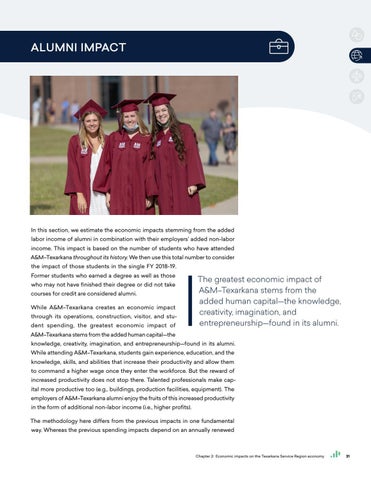ALUMNI IMPACT
In this section, we estimate the economic impacts stemming from the added labor income of alumni in combination with their employers’ added non-labor income. This impact is based on the number of students who have attended A&M–Texarkana throughout its history. We then use this total number to consider the impact of those students in the single FY 2018-19. Former students who earned a degree as well as those who may not have finished their degree or did not take courses for credit are considered alumni. While A&M–Texarkana creates an economic impact through its operations, construction, visitor, and student spending, the greatest economic impact of
The greatest economic impact of A&M–Texarkana stems from the added human capital—the knowledge, creativity, imagination, and entrepreneurship—found in its alumni.
A&M–Texarkana stems from the added human capital—the knowledge, creativity, imagination, and entrepreneurship—found in its alumni. While attending A&M–Texarkana, students gain experience, education, and the knowledge, skills, and abilities that increase their productivity and allow them to command a higher wage once they enter the workforce. But the reward of increased productivity does not stop there. Talented professionals make capital more productive too (e.g., buildings, production facilities, equipment). The employers of A&M–Texarkana alumni enjoy the fruits of this increased productivity in the form of additional non-labor income (i.e., higher profits). The methodology here differs from the previous impacts in one fundamental way. Whereas the previous spending impacts depend on an annually renewed
Chapter 2: Economic impacts on the Texarkana Service Region economy
31








